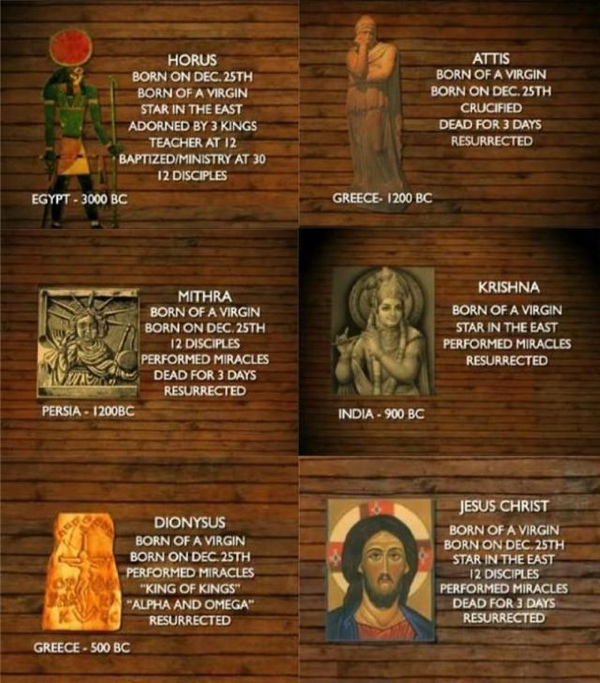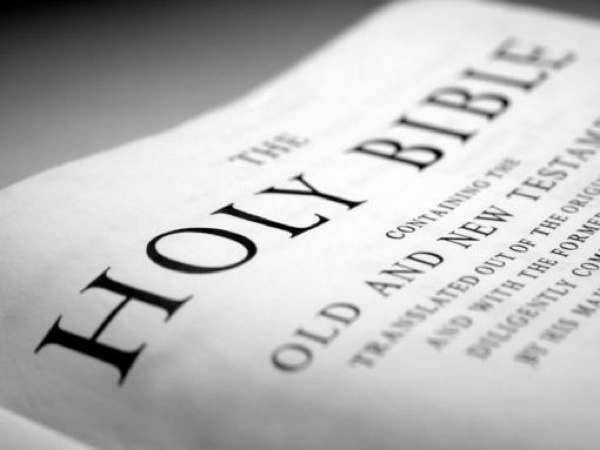 Weird Stuff
Weird Stuff  Weird Stuff
Weird Stuff  Miscellaneous
Miscellaneous 10 LEGO Facts That Will Toy with Your Mind
 Misconceptions
Misconceptions 10 Widespread Historical Myths and the Texts That Started Them
 Crime
Crime 10 Incredible Big-Time Art Fraudsters
 Movies and TV
Movies and TV 10 Most Influential Fictional Objects in Cinema History
 Our World
Our World Top 10 Real Almost‑Cities That Never Materialized
 Technology
Technology 10 Unsettling Ways Big Brother Is (Likely) Spying on You
 Music
Music 10 Chance Encounters That Formed Legendary Bands
 Space
Space 10 Asteroids That Sneaked Closer Than Our Satellites
 Sport
Sport The 10 Least Credible Superstars in Professional Sports
 Weird Stuff
Weird Stuff 10 of History’s Greatest Pranks & Hoaxes
 Miscellaneous
Miscellaneous 10 LEGO Facts That Will Toy with Your Mind
 Misconceptions
Misconceptions 10 Widespread Historical Myths and the Texts That Started Them
Who's Behind Listverse?

Jamie Frater
Head Editor
Jamie founded Listverse due to an insatiable desire to share fascinating, obscure, and bizarre facts. He has been a guest speaker on numerous national radio and television stations and is a five time published author.
More About Us Crime
Crime 10 Incredible Big-Time Art Fraudsters
 Movies and TV
Movies and TV 10 Most Influential Fictional Objects in Cinema History
 Our World
Our World Top 10 Real Almost‑Cities That Never Materialized
 Technology
Technology 10 Unsettling Ways Big Brother Is (Likely) Spying on You
 Music
Music 10 Chance Encounters That Formed Legendary Bands
 Space
Space 10 Asteroids That Sneaked Closer Than Our Satellites
 Sport
Sport The 10 Least Credible Superstars in Professional Sports
10 Reasons for Man to Leave Religion Behind
Regular readers of our site know that it is the purpose of Listverse to inform, entertain, and occasionally spark (ideally) healthy debate. We publish material from many different authors of widely varying backgrounds, and as such, are able to present articles on a huge variety of subjects containing myriad points of view. Since you read the title of the article, you may see where we’re going with this.
It is not our purpose to belittle the beliefs of others, nor to declare any one point of view on such a dense and divisive topic as religion to be the correct one. We assume that our readers are intelligent, well-informed, and capable of thinking for themselves, and that is the end of this disclaimer.
It’s been reported recently that atheism is on the rise worldwide, while religiosity is declining. The relationship between the religious and non-religious has always been a tricky one; while many from each group eventually find themselves forced to admit that there is much to learn from the other, atheists still generally have a tough time accepting the role that religion plays in society—and are of the opinion that humanity would be better off leaving it behind, for a number of reasons. Here are ten of them.

Reason: The Messiah Story Has Been Around For Thousands Of Years
It should be noted that the idea of a divine savior of the human race is practically as old as the human race itself, and has resurfaced continually, echoing throughout our culture for thousands of years. That it continues to be a theme of popular works today is no surprise, but there exists a bitter debate over whether many or most of the major elements of the story of Jesus Christ were co-opted from other sources—some that originated hundreds or even thousands of years before Jesus.
The general assertion by the skeptical is that all of these elements—the virgin birth, significance of the solstices, the miracles, disciples, baptism, crucifixion, resurrection—along with many even more specific elements like Heaven and Hell, the soul, holy communion and others, were all seen before in multiple ancient pagan religions. Many Christians contend that these similarities are a distortion, or the result of ancient records being taken out of context or simply being inaccurate; atheists similarly will point out that practically all ancient records are of questionable accuracy to some degree, including those non-Christian references to the historicity of Jesus.
Modern scholars can only agree on two things about Jesus: that he was baptized, and that he was crucified on the order of Pontius Pilate. All of the other details are disputed by some group of scholars or another, and an examination of the ancient pagan religions predating Jesus—those surrounding Horus, Mithra, Dionysus, Krishna and many others—yields an astounding number of similarities that cannot be explained away as coincidence. These stories seem to be a part of ancient Mediterranean culture, which leads us to the fact that . . .

Reason: “Mythology” Used To Be Religion
When we think of the Greek, Roman, Norse and other mythologies that we studied in school, most of us probably consider them to have the same level of actual historical significance, or value to our modern culture, as The Lord Of The Rings. That is not to say that they have little or no value—these mythologies were an important part of the development of human intellect and understanding of the world, of which we had very little at the time of their inception.
From an atheist point of view, it can be argued that we still had very little understanding of the the way our world works two thousand years ago, and that the application of different aspects of pagan myth to the Christian gospels makes sense—many ancient mythologies borrowed from each other, as we know from our study of the very similar Roman and Greek mythologies and all of their various analogues (Zeus and Jupiter, Venus and Aphrodite, etc.) of the same deity archetypes. These ancient mythologies weren’t myths to the people who created them—they were religion, their way of explaining the world and its mechanics. Mount Olympus was simply the highest mountain in Greece, and to the ancient Greeks it was their version of Heaven, and Zeus their version of God.
This holds true for all ancient and pagan belief systems, which also illustrates the point that Christianity did not bring religion, the concept of salvation, or even monotheism to the world—these things had been in place for centuries. Christianity, Islam and other such belief systems (and there are many similarities there as well) can be seen simply as the myths that have somehow survived to this day.

Reason: The Bible Doesn’t Line Up With Modern Values
The Bible is, obviously, an extremely old text with dozens of interpretations throughout the centuries. The term Christian itself is a rather a blanket term for a dizzying array of belief systems, very few of whom are in complete agreement as to how the Bible should be interpreted—or even in what context specific passages should be taken.
Atheists do have trouble reconciling that the Word Of God, infallible as it should be, would be so open to such wildly varying interpretations—but what they have more trouble with are the passages in the Bible that clearly have absolutely no bearing on any sane, modern system of beliefs and morals. Most are aware of the passages that provide for the keeping of slaves, the wanton murder of homosexuals and adulterers, the selling of children and other such things which have no place in civilized society, let alone in texts that are considered to be holy.
Yes, these things were common 2,000 years ago, but that’s the point—that these do not appear to be the suggestions and guidance of an all-knowing and loving God, but rather of men—not prophets, just men, who were very much of their time. An omnipotent God would have demonstrated an understanding of basic human rights long before we humans got around to realizing, for instance, that slavery is wrong. This limited understanding of historical context works backwards as well as you will see in this next item:

Reason: The Bible Doesn’t Work As A Historical Text
The above-referenced debate as to whether Jesus was actually a historical person (he almost certainly was) notwithstanding, there are myriad problems to be found when attempting to reconcile the Bible’s account of ancient history with the known historical record. Again, these are inaccuracies which would not be expected from an omnipotent being, but would absolutely be expected from a 2,000 year old author with a limited historical and scientific frame of reference.
Take, for example, the story of Noah and the Great Flood, a significant event that, even if it were not worldwide but localized to one region, would have made the historical records of many ancient civilizations. Many Christian scholars believe that it was localized, not a global flood, which explains its absence from the ancient record. The Bible itself says:
“6 The LORD regretted that he had made mankind on the earth, and he felt highly offended. 7 So the LORD said, “I will wipe mankind, whom I have created, from the face of the earth-everything from mankind to animals, including creatures that move on the ground and birds of the air, for I regret that I have made them.” … 11 The earth was ruined in the sight of God; the earth was filled with violence.”
This clearly did not happen—but it was also far from the first “Great Flood” story of the ancient world, another mythological element that has echoed across cultures for millennia. And while it’s easy to argue for the validity of parables and metaphors as a means to understanding human nature and morality, the opposite case can also be made; that it has become unnecessary for us as a species. We have developed into civilized people that understand the concept of morality simply being good for our continued survival.

Reason: Religion Is Behind Many Conflicts, Large And Small
If religiosity is the key to the understanding of human nature and our place in the Universe (or wherever we are), then this is particularly troubling to the skeptic. Yes, “Why does God let bad things happen?” is a well-worn and simplistic argument, but the fact of the existence of numerous bloody religious conflicts throughout history—including those between differing sects of Christianity—combined with the aforementioned Biblical references to the many types of offenders that should be put to death, cannot simply be waved away. Not only is killing for any reason obviously morally wrong, but there’s a direct conflict with the First Commandment, the Christian doctrine of turning the other cheek, and the simple truth that religion and politics—that other great cause of violent conflict—should not be mixed.
The very phrase “King James Bible” is suspicious to the skeptic, as it implies government involvement in the interpretation of religious doctrine, and even the founders of the US thought enough of the issue to include the tenet of separation of church and state within the establishing documents of the nation. But the ability of faith to transform a political moderate into a radical cannot be overstated—and the ability of governments to use said faith to their own ends is easy to see, as it continues to this day.
Many in the US think of religious radicals as those of other religions—alien religions with weird beliefs that make their followers do crazy things, but the truth is that there are radicals of practically every religious affiliation—and that there is no killer more determined than the one who believes with all their heart that God wants them to kill.

Reason: The Religious Are Not Favored
This raises another question: the religiously devoted are certain of the truth of their religion, but there are hundreds, thousands of religions all over the world, and they cannot all be right—unless they are really all just metaphors, different interpretations of a truth that may be beyond our intellectual grasp. So the question is: if one religion is correct, why is it not the only religion? Why are its followers not favored by God? Why is there such widespread disagreement?
There simply is no answer, because there is no one religion that is favored in any measurable way; not by rate of new converts, happiness or comfort of the converted, protection from disease or physical harm, anything. And the notion of a God that must “remain hidden”, that cannot interfere with the lives or fates of his followers, negates the entire concept of prayer—while also raising questions about why God spoke to so many people in Biblical times.
It’s somewhat of a well-known notion that the devoutly religious, when set upon by severe misfortune, will simply think of it as “God’s will”, which we’ll discuss a little more later. But to the skeptic, it follows that an all-knowing God who loves all of his children—and is admittedly “jealous”—would be pleased with those who know the truth, and likely very displeased with the millions of his children who erroneously follow false religions. If this is the case, it is in no way apparent, but it is painfully apparent that…

Reason: The Religious Are Not More Morally Sound Than Others
In fact, religious beliefs are decidedly not an indicator of strong moral values, and vice versa. Among atheists, it is a common misconception that Christians and other religious types are closed-minded, superstitious and judgmental; among the religious, it is a common misconception that the non-religious are depraved, morally reprehensible perverts. Thoughtful people of both types understand that such generalizations fail to hold up in reality, and that morality and religious inclinations (or lack thereof) can be two very separate things.
Indeed, even those who do not believe in a deity should still be able to agree that the core values of most religions—respect for one’s fellow human beings, striving to be a good and worthwhile member of society, an agreement not to steal, cheat or murder—are basic human values that it is the responsibility of every parent on Earth to instill in their children. This does not, however, necessitate the existence of a Creator who enforces these values upon us; nor does the atheist assertion of a lack of said creator imply that we do not have a duty to lead moral lives.
Many agnostics and those who don’t accept the literal truth of religious texts while still holding up the value of religion as a moral guide miss this point. Atheists will counter that there can and must be morality without religion, that we as humans no longer need these parables and metaphors that may have helped to guide us in our early development, but have outlived their usefulness to (reasonably) enlightened, thinking beings.

Reason: Science Is Starting To Answer All Of The Big Questions
The big questions: how did we get here, where did we come from, where are going—have been with us for our entire existence, and we are finally reaching a point in our development where we are beginning to be able to address and even answer some of them. Not in the way our ancestors did, but with new tools and information that have only been recently available to us.
The field of physics, and recently quantum mechanics, has revealed things to us about the world we live in that could not have been known even half a century ago—things like the nature of matter and the structure of cells and proteins—which was about the time that the double-helix model of DNA was accurately hypothesized by James D. Watson and Francis Crick, and the “code” with which we are programmed became known to us.
And while the religious may argue that these things are aspects of God’s design, the skeptic may counter that though there may very well be a design, it does not automatically follow that it is the design of a Creator deity. For what the majority of the devout fail to realize is that…

Reason: There Can Be Spirituality Absent Religion
Not only is there a strong sense of the spiritual among most of those who are atheist, but many of them feel that it is the need for spiritual oneness—the longing that is innate to most of us to be a part of a more significant whole—that is most cruelly exploited by religion. For while the skeptic contends that we were not all created by a God, that does not mean that we all didn’t come from the same place.
Indeed, in purely practical terms, we did—from the universal singularity before all of time and space, before our Universe began, the same “place”—if it can truly be called that—that everything, living and non-living, past, present and future, originated in. This is what Carl Sagan understood when he penned the above quote; that there is no difference between any of us, and manufacturing differences where there are none serve only to isolate and divide.
This need for oneness, for return to a singularity, is a part of human nature that is so very easily manipulated, as those who claim to offer it to us are doubtless aware. But there is no one path to it, no one way; and likewise, no way to absolve ourselves of the one absolute imperative of human existence. This is perhaps the concept that troubles the non-religious the most, because…

Reason: Religion Helps Us Avoid Responsibility
If every aspect of our existence is a part of God’s plan; if everything that has ever happened or will ever happen is God’s will; if we exist only for God, then the need for us to be responsible to and for ourselves is negated.
Even the most heinous crimes against humanity—against ourselves, from the murder of a single child to the Holocaust—can be ascribed to God’s will. But what does that mean for us? In the most practical terms, it means that we are not responsible for our actions. That if a parent abandons a child, a rich man becomes richer off the backs of the poor, a corporation causes irreparable damage to the environment, or a government exterminates thousands of its own innocent citizens, it was all a part of God’s plan. It was inevitable; it could not have been avoided. There is nothing to learn. We are not responsible.
This, of course, can lead into a much longer discussion about destiny versus free will, but thinking people—both religious and non-religious—can and must agree that it is the purpose of the human race to never stop learning, and never stop growing. It’s more than a belief system, and it remains relevant regardless of what you believe or don’t believe—indeed, whether God exists or not. It’s why we’re here, and it’s our responsibility.
You can follow Mike Floorwalker’s blog or Twitter no matter what you believe, so long as you’re cool.








